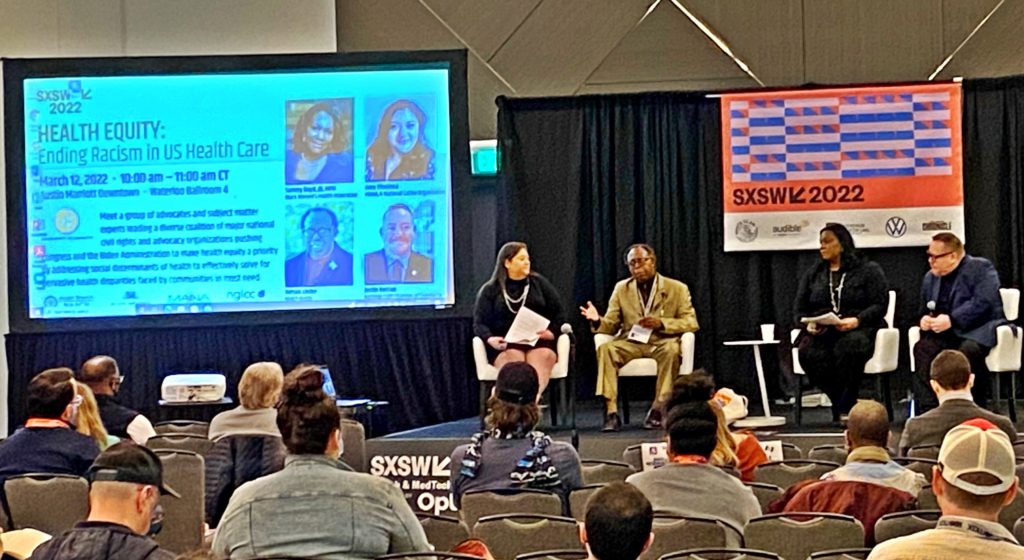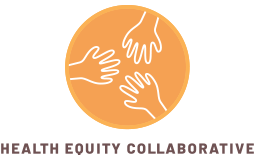15 Mar Health Equity Panel Spotlights HEC Member Initiatives at SXSW
March 15, 2022
This past Saturday, HEC members participated in the annual South by Southwest (SXSW) Conference in Austin, TX. SXSW began in 1987 and has continued to grow in both scope and size every year. After a break of two years due to the COVID-19 pandemic, attendees were excited to get back to this programming.
Our panel discussion, “Health Equity: Ending Racism in US Health Care” featured a distinguished group of leading advocates and subject matter experts who addressed important issues related to health equity. Panelists addressed pervasive disparities faced by underserved communities and provided evidence-based solutions to embed equity in every level of the policy process. Speakers included:
- Tammy Boyd, Chief Policy Officer & Counsel, Black Women’s Health Imperative
- Amy Hinojosa, President and CEO, MANA, A National Latina Organization
- Nelson Linder, President, NAACP Austin
- Justin Nelson, President and Co-founder, National LGBT Chamber of Commerce
Panelists discussed how it’s imperative that lawmakers engage directly with community-based organizations and public health advocates when developing interventions to measurably improve health equity – and what can be done NOW to help those who are disproportionately impacted.
Amy Hinojosa of MANA National discussed disruptive solutions to the inequities pervading our healthcare system. Amy said, “Prescription drug delivery systems should be at the top of the list for a major overhaul. By bringing greater transparency to pricing and eliminating middlemen entities such as pharmacy benefit managers (PBMs) and even insurers, policymakers can clear the path to affordable life-saving medicines and level the playing field for health equity…Cutting out these middlemen — or, at the very least, forcing them to share their massive drug discounts with patients — is precisely the kind of revolutionary reform that could immediately flip some of the inequities in our health system. Mark Cuban took the ball to the goal line by demanding transparency and fairness throughout the prescription drug supply chain. Congress can get the win for consumers and families in most need across the country by following his playbook. The clock is ticking because families in need don’t have the luxury of time.”
Tammy Boyd of Black Women’s Health Imperative began by discussing the importance of lawmakers taking a comprehensive approach to addressing every dimension of the Black maternal health crisis. “Combatting discrimination and countering dangerous pregnancy-related complications takes targeted legislation to ensure there are greater accountability measures and penalties in place for hospitals and health care systems. However, this must be coupled with policy solutions to improve the many social factors which contribute to ongoing disparities experienced by Black mothers including stress, trauma, food insecurity, neighborhood violence, access to prenatal care, and insurance.” Boyd also emphasized that to effectuate real change, all stakeholders and diverse communities must have a seat at the table. She noted the launch of the Rare Disease Diversity Coalition, which brings together rare disease experts, health and diversity advocates, and industry leaders to chart a path forward for rare disease patients of color.
Speaking on behalf of the National LGBT Chamber of Commerce (NGLCC), the leading business voice of the LGBT community, Justin Nelson discussed the importance of increasing supplier diversity in health care and fostering organizational partnerships and investment initiatives with LGBT-owned businesses. Nelson also provided remarks on the recent anti-transgender legislation introduced in seven states, including Texas. “Policies which grant doctors and providers the ability to discriminate against transgender youth if they have faith-based beliefs are hugely problematic.” Nelson concluded, “the refusal to recognize the humanity of a large chunk of their constituency is indicative of a broader issue that we need to get politicians out of the healthcare delivery business and laser-focused on access and affordability issues.”
NAACP’s President Nelson Linder shared his local perspective during the panel and announced the launch of HealthEquityFirst.com. Health Equity First is a new issue-education campaign to raise awareness about misspending by Texas publicly funded hospital districts and the impact on racial health disparities. “Here in Austin and across Texas, voters authorized public hospitals to collect taxes to ensure the healthcare needs of the poor. But our investigations reveal that many of these tax-supported institutions are falling short on this responsibility. Many overlook disadvantaged communities for money-making investments and are allocating only a portion of the taxes collected directly to charity care,” stated Linder. “Public hospital district spending priorities have created healthcare systems that exacerbate racial inequities. We can, and we must do better by the poor,” concluded Linder.



